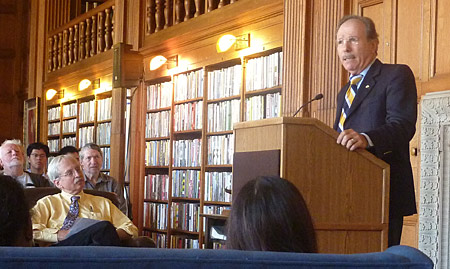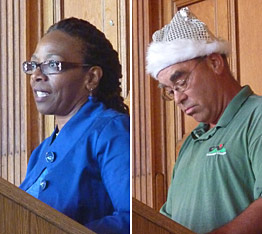Lunch Poems kicks off 17th year
Lunch Poems, the popular campus poetry reading series, launched its 17th year on Sept. 1, with favorite readings by members of the campus community, including the executive vice chancellor and provost, a campus gardener, a Doe Library employee, a Ph.D. student and several professors.
September 8, 2011
Lunch Poems, a popular campus poetry reading series, recently kicked off its 17th year in the Morrison Library of Doe Library. On Sept. 1, a crowd including students, faculty, staff and alumni enjoyed readings of favorite poems by campus community members.

University Librarian Tom Leonard (seated, left) listens to Executive Vice Chancellor George Breslauer discuss the 23rd Psalm during the kick-off event of the Lunch Poems series in the Morrison Library. (Photos by Steven Finacom/UC Berkeley)
“The idea in this beautiful place, this amazing institution, is to ask the Berkeley community to read its poems,” Robert Haas, professor of English and former U.S. Poet Laureate, told the audience.
Held at noon on the first Thursday of every month, Lunch Poems typically begins the academic year with poetry read by campus faculty, staff and students—none of them poets—who have been invited to read or recite a work of poetry with particular meaning for them. (The final Lunch Poems session traditionally features current students who have won literary prizes during the year, other students nominated by faculty, and Lunch Poems volunteers.)
The first reader, professor Ronelle Alexander of Slavic Languages and Literature, selected two poems by Vasko Popa, a Yugoslav poet of Romanian descent. Alexander first read the poems in Popa’s native tongue, then in English.
Executive Vice Chancellor and Provost George Breslauer next came to the podium to note that, although his academic specialty is the Soviet Union, his choice of verse “has nothing to do with Russia; it has everything to do with my own spiritual development.”
He chose to read the King James version of the Bible’s Psalm 23—the familiar “The Lord is my Shepherd” psalm—which Breslauer called “a glorification of a benevolent God.” “What appeals to me about it,” he said of the psalm, “are the cadence and its imagery, which I find mesmerizing.”
He called the psalm “a solace,” but added, “I don’t read Psalm 23 when dealing with campus affairs, but I recite it at 23,000 feet when turbulence hits.”

Library administrator Myrtis Cochran recited Maya Angelou’s “Still I Rise” at the event, while campus gardener George Jacqua wore a found party hat as a prop during his poetry delivery.
Myrtis Cochran, a librarian at the Doe Library, spiritedly read Maya Angelou’s “Still I Rise,” observing that she “was fortunate to hear Dr. Angelou read her poetry many years ago in this very room.” Cochran has the poem posted on her office wall, she said, “for those days when I think I have an insurmountable challenge.”
George Jaqua, a campus gardener who initially came to UC Berkeley as a philosophy student, put on a prop—a silver spangled conical hat he recently found while clearing around trees by Evans Hall—to read his poem. Jaqua recited “Mambo Cadillac” by Barbara Hamby, observing that the poem teaches that “we make a lot of strange choices when desperate times arrive.” The poem’s last lines are: “Things fall apart off the track, and that’s where we’ll be, baby, in your Mambo Cadillac, ‘cause you’re looking for love, but I’m looking for a wreck.”
Associate professor of English Kent Puckett departed from his academic specialty, the 19th century novel, to read “As One Put Drunk into the Packet-Boat,”a 1970s piece by John Ashbery. Puckett said it was a meaningful poem to him, in part, because “my memory of reading this poem for the first time is a memory of reading literature outside an institutional demand,” not for a class assignment or a research requirement.
The event concluded with Samuel Redman, a Ph.D. student in history, reading “The Old Liberators” by Robert Hedin. Redman, who comes from the same hometown as Hedin—Red Wing, Minn.—cited the connection between Hedin’s homage to aging and dying World War II veterans—“each day a little more of their memory goes out, darkens the way a house darkens, It’s rooms quietly filling with evening, Until nothing but the wind lifts the lace curtains…”—and his own current work at the Regional Oral History Office on campus, where he is interviewing World War II workers for the “Rosie the Riveter” project.
For more about Lunch Poems, see lunchpoems.berkeley.edu The webpage also has links to video of past readings.